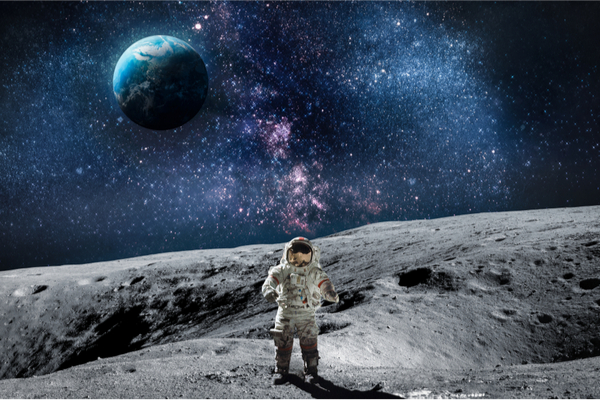With the 50th anniversary of the Apollo 11 mission, there has been plenty of retrospectives and examinations on the impact of the space race and the lunar missions. In addition to a flood of books and documentaries, there are a handful of podcasts as well. One of those new podcasts is The Washington Post’s Moonrise, hosted by Lillian Cunningham.
Cunningham is the creator of a couple of other excellent podcasts — Constitutional, about the stories behind the US Constitution, and Presid`ential, in which she spent each episode talking about each of the then-44 US presidents. The first episode of Moonrise launched on Friday, and over the next 12 episodes, will chronicling the various beats of the space race between the United States and the USSR, how the US developed the technology, and what went into the decision to launch the space program in the first place.
In a recent interview with The Verge, Cunningham said that she was interested in following up Constitutional and Presidential that she and the Post wanted to do “a third investigation of American history,” and that the 50th anniversary represented a good opportunity. “But to me, that actually wasn’t the most interesting thing about it. It was more that with both Presidential and Constitutional, they were podcasts about history, but they were also vehicles for trying to provide context and were an exploration of themes and questions that are on people’s minds right now. It was an opportunity to go back and learn something from history that tells us more about the country that we live in today.”
The story of the space race, she says, was timely. Not because of the 50th anniversary, but because space has become a major topic: the Trump Administration has been pushing for a return to the moon, while private companies like SpaceX and Blue Origin have been making headlines with their own launches and lunar ambitions. “All that kind of added up into a thought that it would be really interesting to look back at this first chapter of history and see what it has to tell us about what we’re going through today.
In particular, Cunningham explained that she was more interested in why we ended up going to the Moon, rather than the how. “I feel like that doesn’t get explored as much, and especially right now with all of the anniversary coverage,” she said. “The story is so often about the astronauts and engineers and the incredible achievement of landing these men on the moon. For me, I felt like I had heard that story enough, but what I didn’t understand as well was why exactly Kennedy set that as a goal, who gave him the idea, and what the whole backstory that led to it.”
Along those lines, she opted to focus on that backstory. “I’m not someone who would define myself as a science fiction fan, but I kind of went down this rabbit hole of getting really interested in the influence of science fiction on the decision to go to the Moon.” Indeed, the first episode delves into the story of John W. Campbell Jr, the editor of Astounding Science Fiction, who is largely credited with launching the Golden Age of science fiction in the 1930s and 1940s. “A lot of what I spent time thinking and researching about was the way that the missions of the 1960s reflected the dreams of the future that were put forward in the ‘30s and ‘40s.”
Looking back on the research, Cunningham noted that what surprised her the most was how many of our memories and stories about the project don’t exactly line up with contemporary reactions. Most American didn’t freak out about Sputnik, and President Dwight Eisenhower essentially dismissed it. “It was really interesting to look back through old presidential records and memos from the NSA about how much they knew about what was coming, and why they weren’t concerned.” The mythos surrounding President John F. Kennedy also surprised her. “All the stuff about how he started to backtrack on his decision and tried to get Khrushchev to make it a joint mission was really interesting to me.”
Ultimately, Cunningham explained that she hopes that people will take away from Moonrise what they took away from Constitutional and Presidential. “I try to approach these as not just a history podcast,” she says “but part of the mission is to clear away some of the myth-making that has sprung up and to examine the narratives that shape the characters from history today.”
You can listen to Moonrise on The Washington Post’s website, and on Apple Podcasts, Google Play, Spotify, and Stitcher.
—
Photo Credit: Dima Zel / Shutterstock.com
